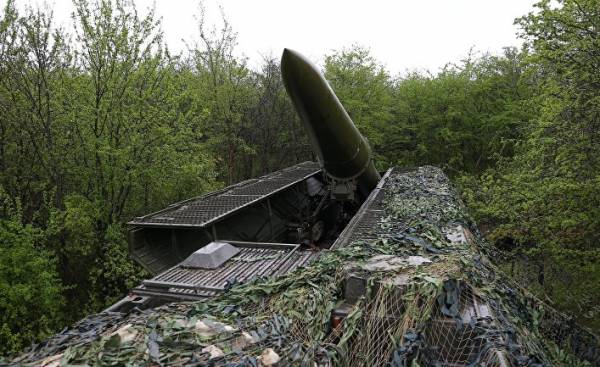
During the election campaign poorly concealed nuclear pacifism Jeremy Corbin considered a goal in its own gate. But critics of labour leader misjudged the public mood. Even moderate conservatives are asking themselves the question about how afford to find themselves in a difficult situation replacing the Trident missiles of deterrence, the cost of which could reach 30 billion pounds.
Nuclear weapons in Britain has gone out of fashion, but in other countries the opposite picture. Western military strategists are more concerned about increasing Russian Arsenal of delivery vehicles short range with warheads of small capacity, which are often called tactical nuclear weapons or battlefield weapons.
This is not a strategic weapon Dr. Strangelove such as our missiles, “Trident” submarine start-up, which during the cold war maintained the balance of terror. These warheads are mounted on missiles “air-surface”, on ballistic short-range missiles, free fall bombs, depth bombs and torpedoes. According to analysis published this week by the Intelligence Department of the Ministry of defense, Russian stockpiles account for about two-thousand units, that is at least four times more American Arsenal in Europe.
In the past, this was considered a drawback, not an advantage, NATO is bigger, richer and stronger than Russia. In the event of an attack using conventional means, the Russian military planners will use the least powerful weapons from its nuclear Arsenal with a goal, as they put it, “de-escalation” of the conflict.
This idea is familiar to us since the days of the cold war. NATO military commanders understood that without the use of nuclear weapons, he has no chance to survive in case of an attack of the Warsaw Pact. On the transfer of American reinforcements across the Atlantic took time, and nuclear weapons were the only means to neutralize the huge advantage of the Tips with non-nuclear forces. Russia knows this, and said that he would never use nuclear weapons first. It was a publicity stunt that allowed to represent the West in the form of a reckless warmonger.
After the collapse of the Soviet Union, the parties are reversed. Having lost its Empire, the Kremlin became a weakness, and in 1993 had renounced its commitment not to use nuclear weapons first. This created a simple stability. NATO wanted to attack Russia, and Russia had powerful defensive Arsenal, to resist which the West was difficult.
Swedish military analytical center FOI has conducted a new study, making the disturbing conclusion that this pattern is changing. This conclusion is confirmed by other analysts from the fields of security and intelligence. One of the highlights is the growing paranoia of Russia, which many in the Kremlin believe that the West is obsessed with regime change in Moscow.
Moreover, in the course of an impressive military modernization in Russia on arms received new types of weapons such as cruise missiles, land-based, capable of carrying a nuclear warhead. Her NATO is not an adequate response. Moreover, the Kremlin no longer considers his Arsenal of tactical weapons just as a deterrent. He believes that such weapons can be useful. The former Director of a nuclear research facility in Sarov Viktor Mikhailov said last year about the prospects, when the Russian weapon of low power can be used as a “nuclear scalpel.” Other Russian military theorists see in this weapon a very powerful piece of artillery.
Russian diplomats are talking about the use of nuclear weapons for political reasons, such as changes in the defence policies of other countries. But they say that their Western interlocutors lose the gift of speech. It seems that in the plans of the Russian military exercises included training on the use of nuclear warheads.
All this creates serious difficulties for the West. To catch up with Russia by number of missiles is prohibitively expensive and unpopular. If today it is difficult to enlist the support of society, even in terms of a replacement “Tridentum” that form the basis of our security, in terms of the additional load on the military budget due to the construction of aircraft carriers, which we used as “white elephants”, to build arguments in favor of other types of nuclear weapons is a fool’s errand.
The answer lies in the revival of arms control and other forms of dialogue. Even if Russia intends to continue to believe their own propaganda about the threat from the West, it is still favorable transparency, verification, and limitations on the number and places of deployment of nuclear weapons. Low oil prices force Russia to take painful decisions about priorities in defence policy, we must urge the Kremlin to take such choices that will make our lives safer, not more risky.
In particular, a good beginning would be the preservation of the Treaty on the elimination of intermediate and shorter-range missiles, which prohibits in Europe the threat of nuclear medium-range missiles. It should also try to revive the Treaty on conventional armed forces in Europe. Deploying additional troops in the frontline States, such as Estonia, Latvia, Lithuania and Norway, NATO reassured them, and now can negotiate from a position of strength.
But the study of Swedish FOI center also notes that we need to change our way of thinking in all areas since the civil defense and combat readiness, and ending with the contingency plan that is consistent with the plans of Russia, lowering the threshold of use of nuclear weapons. If we do not want that in Europe there is a new nuclear weapon, we have to look for other answers, say, missiles, stealth, long-range with non-nuclear warheads that are capable of filling the gaps in our deterrent force. Finland and Poland have already bought such missiles. Other countries can do it too. We also need to perform other forms of deterrence, for example, the rapid seizure and freezing of Russian assets in the West that you can use to end the conflict before the use of force.
The most important questions — political, not military. Russia compensates for its weaknesses with an iron determination. Nuclear bravado so weak and leading to the decline of the country as Russia will result only in the case if it weakens the will of its opponents. What our will is?
Edward Lucas writes for The Economist.






